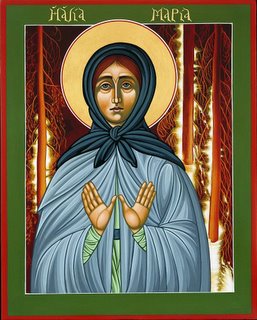Maria of Olonets: An Example of Good Useless

Maria of Olenets lived in 19th century Russia. She was a "desert dweller" which means she lived deep in the forest and adored God in solitude and silence.
She would be deemed useless, but a good useless, in our time of productivity and material usefulness.
Often it seems I run up against those who desire me to be "balanced." I admit that surely I've been concerned with this, myself. I used to try to explain that I am "balanced" in that on a line of 1% to 100%, I might be in the extreme 10%, but within that 10% I am toward the center, thus in balance.
Abbot Herman of the St. Herman of Alaska Brotherhood wrote in the introduction to "Maria of Olonets" of "wholeness". He states:
"The integral nature or wholeness of Maria of Olonets points also to the power present in her--a power which enabled her to be totally free and to focus herself on the otherworldly meaning of humanity. These very qualities are being threatened with extinction today, which gives all the more reason for modern ascetics to draw strength from Righteous Maria and those like her, in order to be clothed in the image and likeness of Christ."
Mother Brigid of St. Xenia Skete delves, in the first introduction of the book, into aspects of the individual parts of the whole, of Christ's Body, in a way which better illumines the kind of balance to which a victim soul resolves such conflict.
"Monasticism arose specifically when the Church was recognized by the governmental authorities to have a right to exist openly in society, and in fact became closely bound up with worldly authority, with the persecution of Christians ceasing. In a sense, this is contrary to the essence of Christianity, whose adherents are called to be like their Master, Who was despised, rejected and killed by the authorities of this world. The Church (and even each individual Christian), being Christ's Body, must reflect this in itself somewhere. And monastics, fools-for-Christ's sake, hermits, and of course martyrs [and here we add victim souls]...are those people who are particularly called by God to complete this aspect of the Church, without which it could not truly be Christ's Body. Of course, the Church, because it exists in this temporal, fallen world, must also have an external organization to be able to function in an orderly manner here; but this aspect of the Church must remain within its proper limitations."
A victim soul is one aspect of Christ. One called to be good useless is one aspect of Christ. To be good useless is a form of suffering in conformity to Christ in the desert, Christ praying on the mountain, Christ alone in the Garden of Gethsemene, Christ crucified, Christ lifeless in His mother's arms and laid in the tomb.

